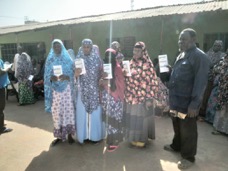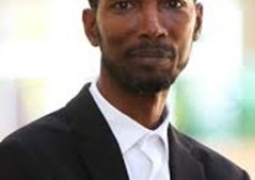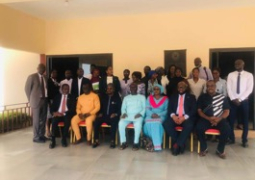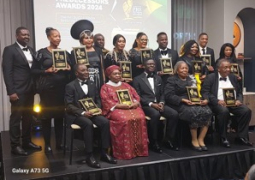
The Nafa Cash Transfer program was designed to support people in rural communities that are identified as belonging to the extreme poor households in The Gambia.
Funded by the World Bank, the Nafa Cash Transfer Project is implemented by the National Nutrition Agency Department of Community Development and Directorate of Social Welfare in collaboration with The Gambia Resilience, Inclusion, Skills and Equity (RISE).
The Gambia RISE Nafa Program is a combination of Cash Transfer and Social and Behavioural Change Communication (SBCC) that is implemented in rural districts.
Since this latest round of the Nafa Cash Transfer disbursement project began on 15 November 2024, NaNA and stakeholders have so far covered numerous rural communities where D12,840, 000 was paid to 4280 poor households in communities in the Central River Region-south, (CRR-South.)
D654,000 was disbursed to 218 households in Koina community, Upper River Region, on Saturday 23 November 2024, and D174,000 to other 58 beneficiaries in Fantumbung village, Upper River Region.
On Sunday, 24 November 2024, NaNA and other stakeholders further disbursed D636,000 to 212 beneficiaries in the community of Fullabantang in the Central River Region and D342,000 to 114 beneficiaries in Faraba village, Central River Region.
Showing their appreciations after receiving their payments, Bintou Fatty, a resident of Koina community and a tenth time beneficiary, said: “We use the money to buy food for our family and save part of it, and we take part of it to assist our pregnant women at home when they are in need. We also use part of the money for our school-going children.”
She added: “At the household level, we also used part of the money of the previous cash transfer programs to buy goats and sheep, which would eventually help us for other future needs, particularly when we are out of cash.”
They could sell these domestic animals to solve their urgent needs such as buying other food items, she said.
Madam Fatty commended all stakeholders involved in the Cash Transfer project, saying the project has played a pivotal role in cushioning the blow of extreme poverty in their lives.
Bae Sakiliba, also a tenth-time beneficiary, thanked stakeholders of the project for the continued support, saying she was also able to buy some domestic animals from part of the money she received in the previous programs, which she would resell to gain more income to support her family and other needs.
Musa Dahaba, senior program officer responsible for micro-nutrient deficiency control program at the NaNA, said most of the cash transfer goes with a lot of things including the Social and Behavioral Change Communication health (SBCC) and Nutrition messages they give out.
The SBCC is a very significant component of the Cash Transfer, he said, adding that as part of the Nafa Cash Transfer, they also give beneficiaries relevant information.
This will help them build resilience at the household level, Dahaba stated, saying they also have about 45 pay-points within URR South and North.
“We are giving out this money to bring families together so the SBCC clears those grievance, and we actually do not want any grievance,” he said. “Sometimes you may have some grievance, but the money is here to put families together and this support is here to make ends meet and not to separate them. These are the kinds of emphasis we put across during the SBCC program.”
They also sensitised beneficiaries on pneumonia and fire incidents, he added.
Read Other Articles In Headlines
Senegalese businessman to be paid over D200,000 as court ordered
Jul 2, 2025, 11:03 AM




